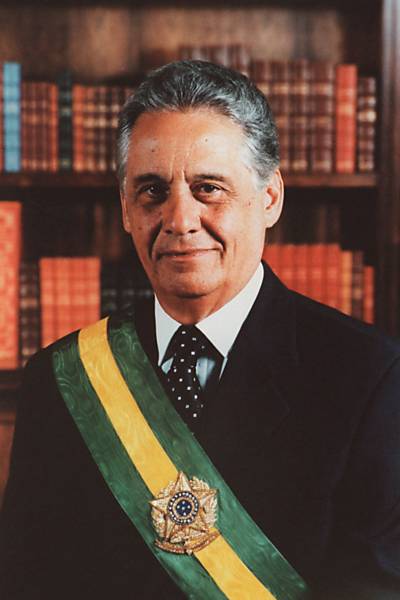
Fernando Henrique Cardoso
Fernando Henrique Cardoso GCB GCTE GCoIISE GColIH GColL GCM RE DMN CYC OMRI (Portuguese: [feʁˈnɐ̃du ẽˈʁiki kaʁˈdozu] ⓘ; born 18 June 1931), also known by his initials FHC (Portuguese: [ɛfjaɡaˈse] ⓘ), is a Brazilian sociologist, professor, and politician[1] who served as the 34th president of Brazil from 1 January 1995 to 1 January 2003.[2] He was the first Brazilian president to be reelected for a subsequent term. An accomplished scholar of dependency theory noted for his research on slavery and political theory, Cardoso has earned many honors including the Prince of Asturias Award for International Cooperation (2000)[3] and the Kluge Prize from the US Library of Congress (2012).[4]
"Fernando Cardoso" redirects here. For other uses, see Fernando Cardoso (disambiguation).
Fernando Henrique Cardoso
Eliseu Resende
Cândido Procópio Ferreira
18 June 1931
Rio de Janeiro, Federal District, Brazil
PSDB (1988–present)
3
Pedro Cardoso (cousin)
Cardoso was the 10th president of the International Sociological Association (1982–1986).[5]
Academic career[edit]
Cardoso earned a bachelor's degree in Social Sciences from Universidade de São Paulo in 1952, from where he also earned a Master's and a Doctorate in Sociology. His doctoral thesis, under the supervision of Florestan Fernandes, examined the institution of slavery in Southern Brazil, critiquing, from a Marxist perspective, the dominant approach of Gilberto Freyre to the topic. It has since become a classic on the subject. Cardoso also received the Livre-Docência degree in 1963, the most senior level of academic recognition in Brazil, also from Universidade de São Paulo. In 1968, he received the title of Cathedratic Professor, holding the chair of Political Science at Universidade de São Paulo.[11]
As he continued his academic career abroad in Chile and France after the tightening of the Brazilian military dictatorship, Cardoso published several books and papers on state bureaucracy, industrial elites and, particularly, dependency theory. His work on dependency would be his most acclaimed contribution to sociology and development studies, especially in the United States.[19] After presiding the International Sociological Association from 1982 to 1986 Cardoso was selected as a Fulbright Program 40th anniversary distinguished fellow and in that capacity was a visiting scholar and lectured at Columbia University on democracy in Brazil.[20] Cardoso currently gives speeches and classes abroad.[21] In June 2013 he was elected as a member of Academia Brasileira de Letras. He said his election was due to recognition for his academic achievements, rather than his political career.[22][23]
Elections[edit]
After his return to Brazil, Fernando Henrique engaged with the burgeoning democratic opposition to the military-dominated regime both as an intellectual and as a political activist. He became Senator from São Paulo for the former Brazilian Democratic Movement (MDB) in 1982, replacing Franco Montoro, the newly elected governor of São Paulo. In 1985, he ran unsuccessfully for mayor of São Paulo against former President Jânio Quadros. Ahead in the polls, he let himself be photographed in the mayor's chair before the elections. Some attribute his loss to this episode.[24]
Elected to the Senate in 1986 for the Party of the Brazilian Democratic Movement (PMDB), which MDB became after re-democratization, he joined a group of PMDB parliamentarians who left that party to found the Brazilian Social Democratic Party (PSDB) after previously held PMDB positions shifted to the right when the party filled with politicians who had collaborated with the dictatorship. As a senator, Cardoso took part in the 1987–1988 National Constituent Assembly that drafted and approved Brazil's current Constitution in the wake of the country's re-democratization. In the early stages of the Constituent Assembly's work (from February to March 1987), Cardoso led the committee that drafted the internal rules of procedure, including the procedural rules governing the drafting of the Constitution itself. These rules of procedure were adopted by the Assembly and published on 25 March 1987. Until 1992, Cardoso served as Leader of the PSDB in the Senate. From October 1992 to May 1993, he served as Minister of Foreign Affairs under President Itamar Franco (PMDB).[25]
From May 1993 to April 1994, he was Minister of Finance and resigned in April 1994 to launch a presidential campaign. In the 3 October election, he won the presidency in the first round of voting with 54% of the vote, more than twice that of his nearest opponent, Luiz Inácio Lula da Silva. This is still the largest margin of victory ever recorded in a free election in Brazilian history. After the constitution was amended to allow a president to succeed himself, he won a second term almost as easily in 1998, taking 53% to Lula's 31.7% to win in a single round. To date, he is the only president to win an outright majority of the popular vote, and the only one to win the presidency in a single round since the institution of the two-round system in 1989.
Cardoso was succeeded in 2003 by Lula da Silva, who ran for the fourth time and had come in second on prior attempts. Lula won in the runoff election against the Cardoso-supported candidate, José Serra. Lula's election has been interpreted as resulting from Cardoso's low approval ratings in his second term.[26]
